
Oleksandr Oleksandrovych Moroz is a Ukrainian politician. He was the Speaker of Verkhovna Rada (parliament) of Ukraine twice: July 2006 to September 2007, and previously in 1994 through 1998. Moroz is one of the founders and leader of the Socialist Party of Ukraine, which was an influential political party in Ukraine. Moroz lost Parliamentary representation when the Socialist Party of Ukraine failed to secure sufficient number of votes (2.86%) in the 2007 snap election falling 0.14% short of the 3% election threshold.
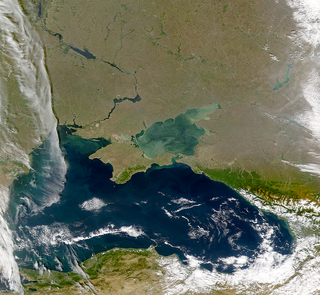
The recorded history of the Crimean Peninsula, historically known as Tauris, Taurica, and the Tauric Chersonese, begins around the 5th century BC when several Greek colonies were established along its coast. The southern coast remained Greek in culture for almost two thousand years as part of the Roman Empire, and its successor states, the Byzantine Empire, the Empire of Trebizond, and the independent Principality of Theodoro. In the 13th century, some port cities were controlled by the Venetians and by the Genovese. The Crimean interior was much less stable, enduring a long series of conquests and invasions; by the early medieval period it had been settled by Scythians (Scytho-Cimmerians), Tauri, Greeks, Romans, Goths, Huns, Bulgars, Kipchaks and Khazars. In the medieval period, it was acquired partly by Kievan Rus', but fell to the Mongol invasions as part of the Golden Horde. They were followed by the Crimean Khanate and the Ottoman Empire, which conquered the coastal areas as well, in the 15th to 18th centuries.

The State Council of Crimea is the parliament of the Republic of Crimea. It had previously been called the 'Supreme Council of Crimea but changed its name in March 2014 following a vote by the Ukrainian parliament to dissolve the Supreme Council of Crimea. The Parliament is housed in the Parliament building in the centre of Simferopol.
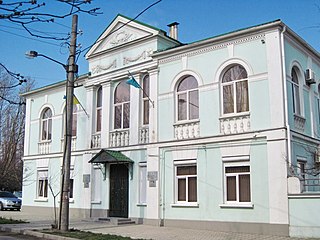
The Mejlis of the Crimean Tatar People is the single highest executive-representative body of the Crimean Tatars in period between sessions of the Qurultay of the Crimean Tatar People.
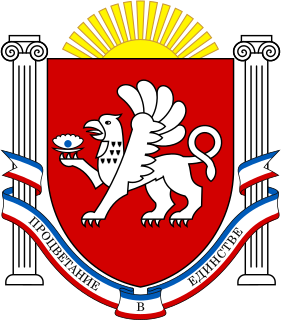
The Chairman of the Council of Ministers of the Republic of Crimea is the head of government of the Republic of Crimea,.
The politics of Crimea today is that of the Republic of Crimea on one hand, and that of the federal city of Sevastopol on the other, within the context of the largely unrecognised annexation of Crimea by the Russian Federation in March 2014.

The Party "Soyuz" is a national political party of Ukraine that is mostly based in Crimea. It was registered in June 1997 under a registration number 867.

The 2010 Crimean parliamentary election were held on 31 October 2010 as a part of the general 2010 Ukrainian local elections. Unlike the previous election to the Verkhovna Rada of Crimea, they were conducted on the mixed member proportional representation system. In order to gain representation in the Parliament of the Autonomous Republic of Crimea, a party or bloc had to garner at least 3 percent of the total vote. The Party of Regions won the elections with an overwhelming majority.
The constitution of the Autonomous Republic of Crimea is the basic law of the Autonomous Republic of Crimea, a republic on the Crimean peninsula as part of Ukraine. The constitution establishes the republic's status and authority within Ukraine. It granted Crimea the right to draft a budget and manage its own property. The constitution was repealed by a disputed referendum during the 2014 Crimean crisis, after which the Republic of Crimea was established as a federal subject of Russia after the annexation of the peninsula. The Ukrainian government has refused to recognize the annexation of Crimea by Russia and still recognizes the constitution as active.

The Council of Ministers of the Autonomous Republic of Crimea, briefly SovMin, was until February 27, 2014 the executive branch of government of the Autonomous Republic of Crimea, a republic within southern Ukraine. The Council of Ministers derived its authority from the Constitution and laws of Ukraine and normative acts of the Verkhovna Rada of Crimea which bring them into its competency.

Verkhovna Rada of Crimea or the Supreme Council of Crimea, officially the Supreme Council of the Autonomous Republic of Crimea was a Ukrainian legislative body of the Autonomous Republic of Crimea before the annexation of Crimea by the Russian Federation in 2014.
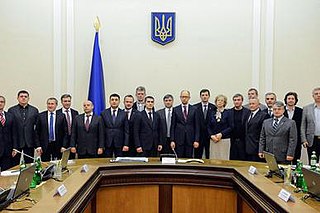
The first government headed by Arseniy Yatsenyuk was created in Ukraine on 27 February 2014 in the aftermath of the Ukrainian revolution. The cabinet was formed as a coalition of the parties Batkivschyna, UDAR and Svoboda and the parliamentary factions Economic Development and Sovereign European Ukraine and other independent MPs. On 24 July 2014, UDAR and Svoboda and 19 independent MPs had exited from the coalition to pave the way for the early parliamentary elections of late October 2014. Prime Minister Yatsenyuk announced his resignation the same day, but the Verkhovna Rada declined his resignation on 31 July 2014.
![Autonomous Republic of Crimea administrative division of Ukraine since 1992, not occupying the whole peninsula [see Q15966495 for Russian subdivision proclaimed in 2014]](https://upload.wikimedia.org/wikipedia/commons/thumb/a/aa/Flag_of_Crimea.svg/320px-Flag_of_Crimea.svg.png)
The Autonomous Republic of Crimea is, de jure, an autonomous republic of Ukraine encompassing most of Crimea, though, de facto, it was annexed by the Russian Federation in 2014.

The 2014 Ukrainian local elections took place on 25 May 2014, four years after the conclusion of the last local elections, which took place in October 2010. The elections occurred during the political crisis in the aftermath of the 2014 Ukrainian revolution.

The Crimean Peninsula was annexed from Ukraine by the Russian Federation in February–March 2014 and since then has been administered as two Russian federal subjects—the Republic of Crimea and the federal city of Sevastopol. The annexation followed a military intervention by Russia in Crimea that took place in the aftermath of the 2014 Ukrainian revolution and was part of wider unrest across southern and eastern Ukraine.
For Peace and Stability was a Ukrainian parliamentary faction in its national parliament Verkhovna Rada from 2 July 2014 till 27 November 2014. The group included 34 MPs.
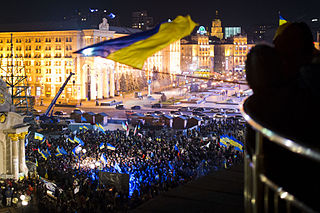
Creating Agreement on settlement of political crisis in Ukraine – the documents, signed on 21 February 2014 by the President of Ukraine Viktor Yanukovych and the leaders of the parliamentary opposition under the mediation of the European Union and the Russian Federation. The signing of the Agreement was intended to stop the mass bloodshed in Kiev and to end the sharp political crisis, which began in November 2013 in connection with the decision of Ukrainian authorities to suspend the process of signing the Association agreement with the European Union.






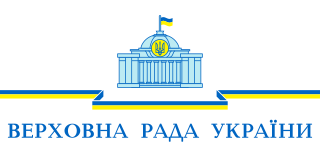
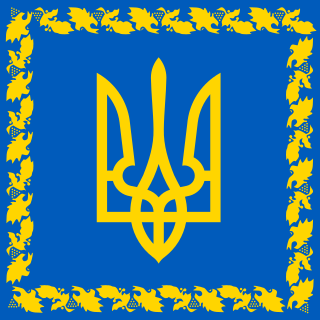



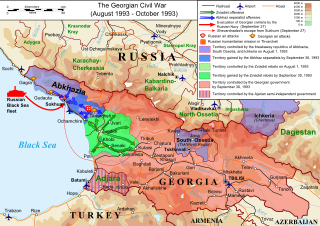








![Autonomous Republic of Crimea administrative division of Ukraine since 1992, not occupying the whole peninsula [see Q15966495 for Russian subdivision proclaimed in 2014]](https://upload.wikimedia.org/wikipedia/commons/thumb/a/aa/Flag_of_Crimea.svg/320px-Flag_of_Crimea.svg.png)


